Toolkit: Financial Management, HR Lifecycle, Legal & Functions
VerifiedAdded on 2023/06/13
|18
|4457
|282
Report
AI Summary
This report provides a comprehensive overview of essential components within a hospitality business, focusing on Hilton International as a case study. It delves into financial transaction management, including source documents, recording processes, and the double-entry bookkeeping system. The report investigates principles for managing and monitoring financial performance, analyzes different types of costs, and emphasizes the importance of accurate transaction recording. Furthermore, it reviews the HR lifecycle, addressing talent acquisition and retention issues in the food and beverage sector, and develops a performance management plan. The document identifies relevant legislation, examines the impact of employment and contract law, and critically reflects on ethical issues. Finally, it explores functional roles within the hospitality sector, explains communication methods, and analyzes coordination and integration effectiveness, offering recommendations for enhanced business performance. Desklib provides access to similar solved assignments and study tools for students.
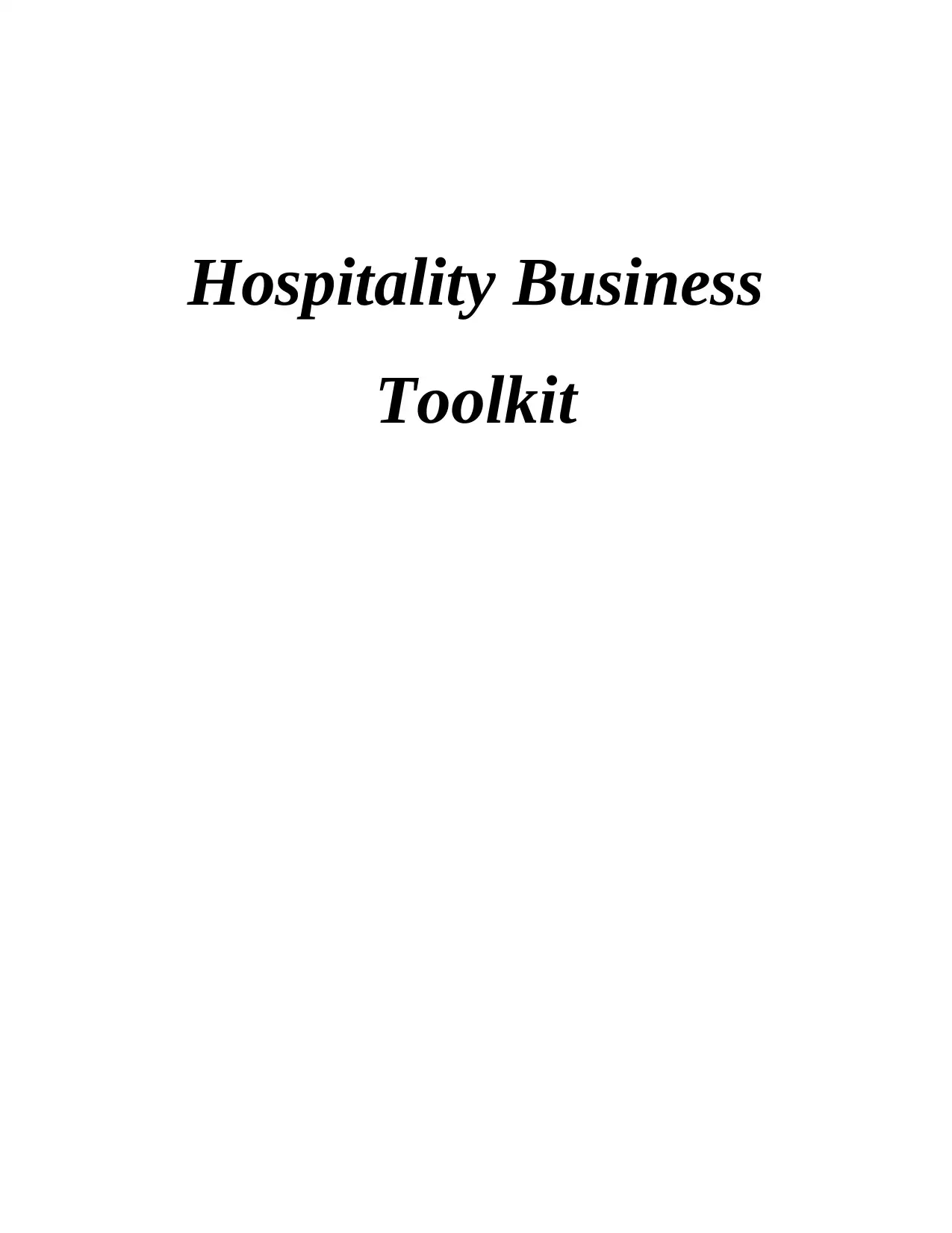
Hospitality Business
Toolkit
Toolkit
Paraphrase This Document
Need a fresh take? Get an instant paraphrase of this document with our AI Paraphraser
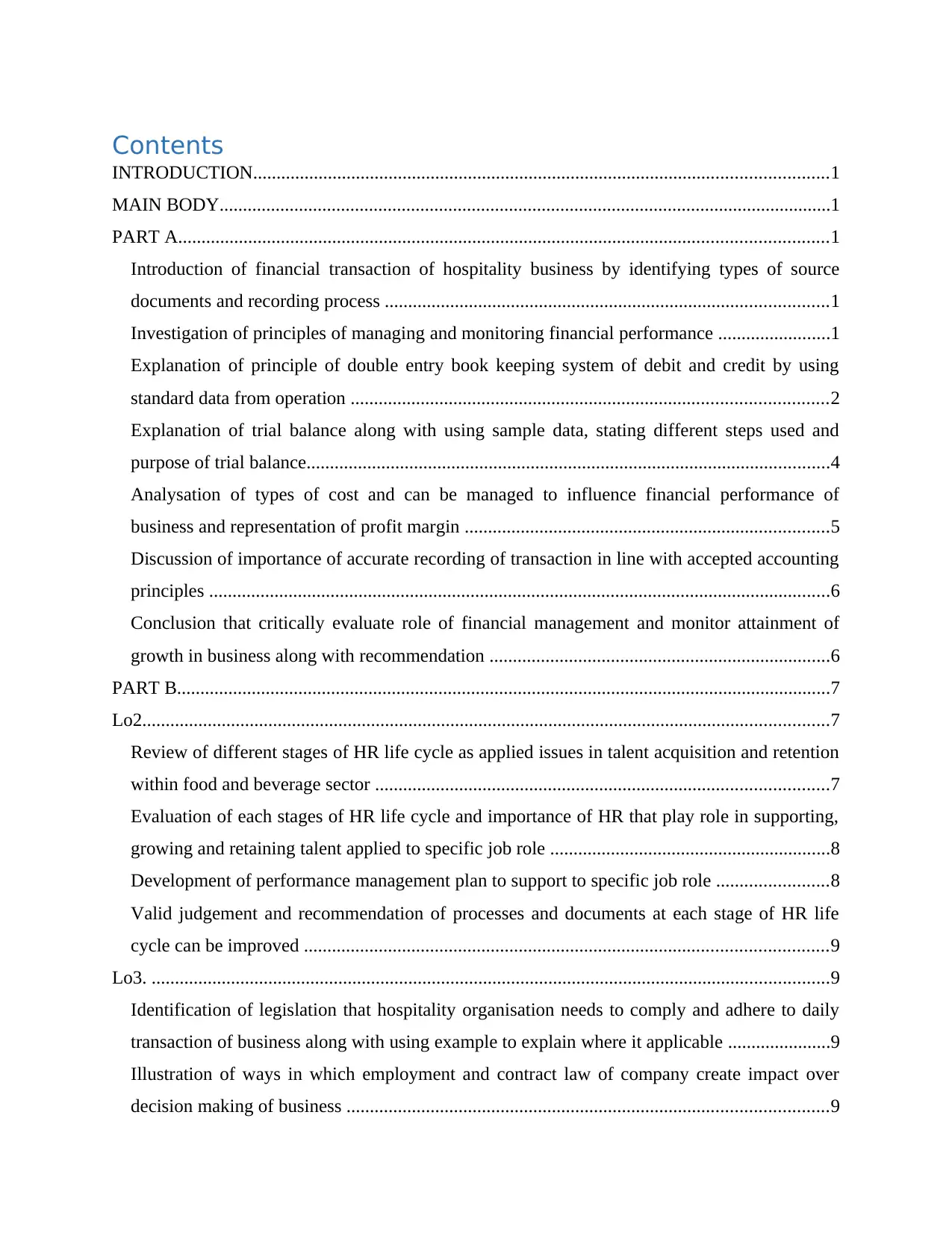
Contents
INTRODUCTION...........................................................................................................................1
MAIN BODY...................................................................................................................................1
PART A...........................................................................................................................................1
Introduction of financial transaction of hospitality business by identifying types of source
documents and recording process ...............................................................................................1
Investigation of principles of managing and monitoring financial performance ........................1
Explanation of principle of double entry book keeping system of debit and credit by using
standard data from operation ......................................................................................................2
Explanation of trial balance along with using sample data, stating different steps used and
purpose of trial balance................................................................................................................4
Analysation of types of cost and can be managed to influence financial performance of
business and representation of profit margin ..............................................................................5
Discussion of importance of accurate recording of transaction in line with accepted accounting
principles .....................................................................................................................................6
Conclusion that critically evaluate role of financial management and monitor attainment of
growth in business along with recommendation .........................................................................6
PART B............................................................................................................................................7
Lo2...................................................................................................................................................7
Review of different stages of HR life cycle as applied issues in talent acquisition and retention
within food and beverage sector .................................................................................................7
Evaluation of each stages of HR life cycle and importance of HR that play role in supporting,
growing and retaining talent applied to specific job role ............................................................8
Development of performance management plan to support to specific job role ........................8
Valid judgement and recommendation of processes and documents at each stage of HR life
cycle can be improved ................................................................................................................9
Lo3. .................................................................................................................................................9
Identification of legislation that hospitality organisation needs to comply and adhere to daily
transaction of business along with using example to explain where it applicable ......................9
Illustration of ways in which employment and contract law of company create impact over
decision making of business .......................................................................................................9
INTRODUCTION...........................................................................................................................1
MAIN BODY...................................................................................................................................1
PART A...........................................................................................................................................1
Introduction of financial transaction of hospitality business by identifying types of source
documents and recording process ...............................................................................................1
Investigation of principles of managing and monitoring financial performance ........................1
Explanation of principle of double entry book keeping system of debit and credit by using
standard data from operation ......................................................................................................2
Explanation of trial balance along with using sample data, stating different steps used and
purpose of trial balance................................................................................................................4
Analysation of types of cost and can be managed to influence financial performance of
business and representation of profit margin ..............................................................................5
Discussion of importance of accurate recording of transaction in line with accepted accounting
principles .....................................................................................................................................6
Conclusion that critically evaluate role of financial management and monitor attainment of
growth in business along with recommendation .........................................................................6
PART B............................................................................................................................................7
Lo2...................................................................................................................................................7
Review of different stages of HR life cycle as applied issues in talent acquisition and retention
within food and beverage sector .................................................................................................7
Evaluation of each stages of HR life cycle and importance of HR that play role in supporting,
growing and retaining talent applied to specific job role ............................................................8
Development of performance management plan to support to specific job role ........................8
Valid judgement and recommendation of processes and documents at each stage of HR life
cycle can be improved ................................................................................................................9
Lo3. .................................................................................................................................................9
Identification of legislation that hospitality organisation needs to comply and adhere to daily
transaction of business along with using example to explain where it applicable ......................9
Illustration of ways in which employment and contract law of company create impact over
decision making of business .......................................................................................................9
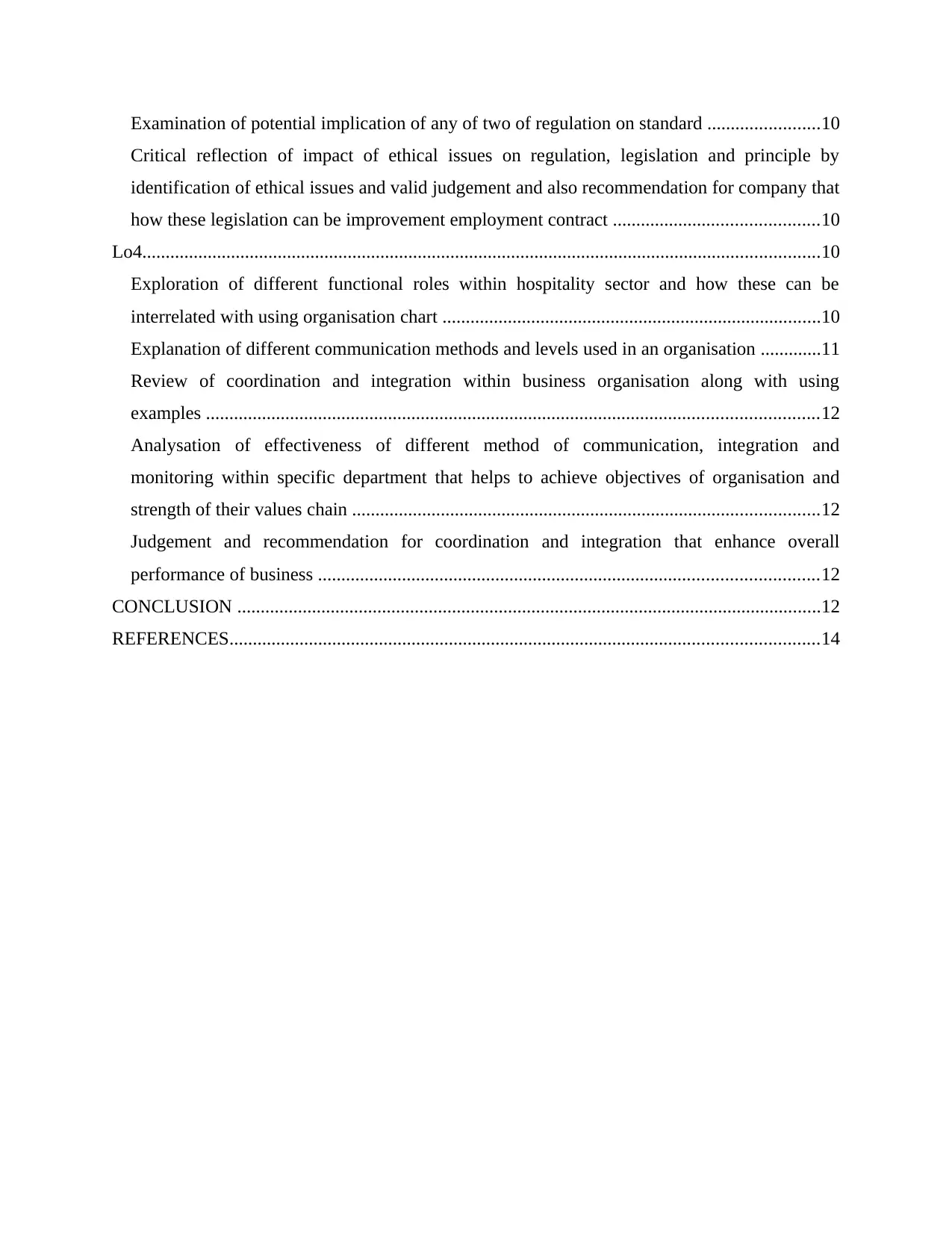
Examination of potential implication of any of two of regulation on standard ........................10
Critical reflection of impact of ethical issues on regulation, legislation and principle by
identification of ethical issues and valid judgement and also recommendation for company that
how these legislation can be improvement employment contract ............................................10
Lo4.................................................................................................................................................10
Exploration of different functional roles within hospitality sector and how these can be
interrelated with using organisation chart .................................................................................10
Explanation of different communication methods and levels used in an organisation .............11
Review of coordination and integration within business organisation along with using
examples ...................................................................................................................................12
Analysation of effectiveness of different method of communication, integration and
monitoring within specific department that helps to achieve objectives of organisation and
strength of their values chain ....................................................................................................12
Judgement and recommendation for coordination and integration that enhance overall
performance of business ...........................................................................................................12
CONCLUSION .............................................................................................................................12
REFERENCES..............................................................................................................................14
Critical reflection of impact of ethical issues on regulation, legislation and principle by
identification of ethical issues and valid judgement and also recommendation for company that
how these legislation can be improvement employment contract ............................................10
Lo4.................................................................................................................................................10
Exploration of different functional roles within hospitality sector and how these can be
interrelated with using organisation chart .................................................................................10
Explanation of different communication methods and levels used in an organisation .............11
Review of coordination and integration within business organisation along with using
examples ...................................................................................................................................12
Analysation of effectiveness of different method of communication, integration and
monitoring within specific department that helps to achieve objectives of organisation and
strength of their values chain ....................................................................................................12
Judgement and recommendation for coordination and integration that enhance overall
performance of business ...........................................................................................................12
CONCLUSION .............................................................................................................................12
REFERENCES..............................................................................................................................14
⊘ This is a preview!⊘
Do you want full access?
Subscribe today to unlock all pages.

Trusted by 1+ million students worldwide

Paraphrase This Document
Need a fresh take? Get an instant paraphrase of this document with our AI Paraphraser
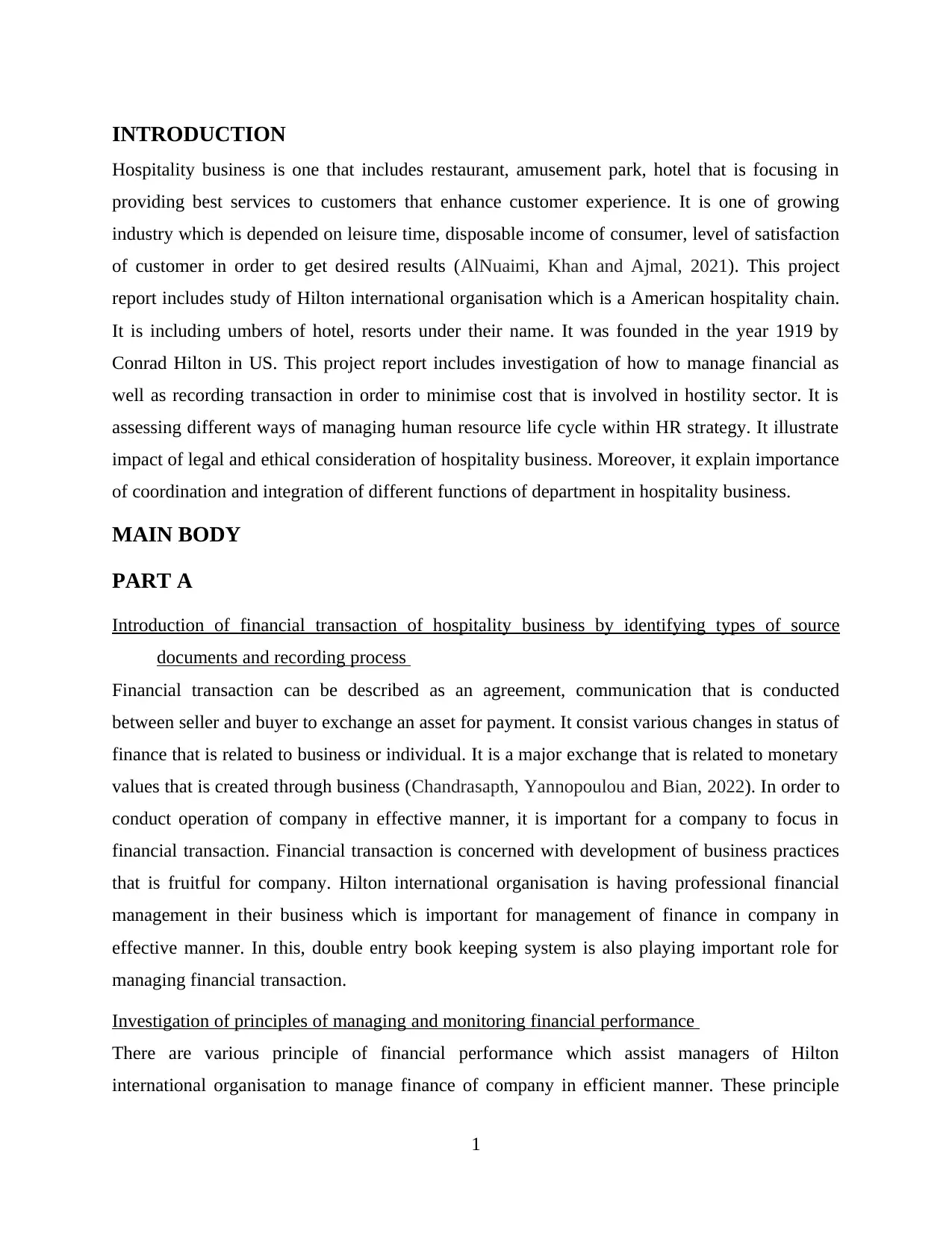
INTRODUCTION
Hospitality business is one that includes restaurant, amusement park, hotel that is focusing in
providing best services to customers that enhance customer experience. It is one of growing
industry which is depended on leisure time, disposable income of consumer, level of satisfaction
of customer in order to get desired results (AlNuaimi, Khan and Ajmal, 2021). This project
report includes study of Hilton international organisation which is a American hospitality chain.
It is including umbers of hotel, resorts under their name. It was founded in the year 1919 by
Conrad Hilton in US. This project report includes investigation of how to manage financial as
well as recording transaction in order to minimise cost that is involved in hostility sector. It is
assessing different ways of managing human resource life cycle within HR strategy. It illustrate
impact of legal and ethical consideration of hospitality business. Moreover, it explain importance
of coordination and integration of different functions of department in hospitality business.
MAIN BODY
PART A
Introduction of financial transaction of hospitality business by identifying types of source
documents and recording process
Financial transaction can be described as an agreement, communication that is conducted
between seller and buyer to exchange an asset for payment. It consist various changes in status of
finance that is related to business or individual. It is a major exchange that is related to monetary
values that is created through business (Chandrasapth, Yannopoulou and Bian, 2022). In order to
conduct operation of company in effective manner, it is important for a company to focus in
financial transaction. Financial transaction is concerned with development of business practices
that is fruitful for company. Hilton international organisation is having professional financial
management in their business which is important for management of finance in company in
effective manner. In this, double entry book keeping system is also playing important role for
managing financial transaction.
Investigation of principles of managing and monitoring financial performance
There are various principle of financial performance which assist managers of Hilton
international organisation to manage finance of company in efficient manner. These principle
1
Hospitality business is one that includes restaurant, amusement park, hotel that is focusing in
providing best services to customers that enhance customer experience. It is one of growing
industry which is depended on leisure time, disposable income of consumer, level of satisfaction
of customer in order to get desired results (AlNuaimi, Khan and Ajmal, 2021). This project
report includes study of Hilton international organisation which is a American hospitality chain.
It is including umbers of hotel, resorts under their name. It was founded in the year 1919 by
Conrad Hilton in US. This project report includes investigation of how to manage financial as
well as recording transaction in order to minimise cost that is involved in hostility sector. It is
assessing different ways of managing human resource life cycle within HR strategy. It illustrate
impact of legal and ethical consideration of hospitality business. Moreover, it explain importance
of coordination and integration of different functions of department in hospitality business.
MAIN BODY
PART A
Introduction of financial transaction of hospitality business by identifying types of source
documents and recording process
Financial transaction can be described as an agreement, communication that is conducted
between seller and buyer to exchange an asset for payment. It consist various changes in status of
finance that is related to business or individual. It is a major exchange that is related to monetary
values that is created through business (Chandrasapth, Yannopoulou and Bian, 2022). In order to
conduct operation of company in effective manner, it is important for a company to focus in
financial transaction. Financial transaction is concerned with development of business practices
that is fruitful for company. Hilton international organisation is having professional financial
management in their business which is important for management of finance in company in
effective manner. In this, double entry book keeping system is also playing important role for
managing financial transaction.
Investigation of principles of managing and monitoring financial performance
There are various principle of financial performance which assist managers of Hilton
international organisation to manage finance of company in efficient manner. These principle
1
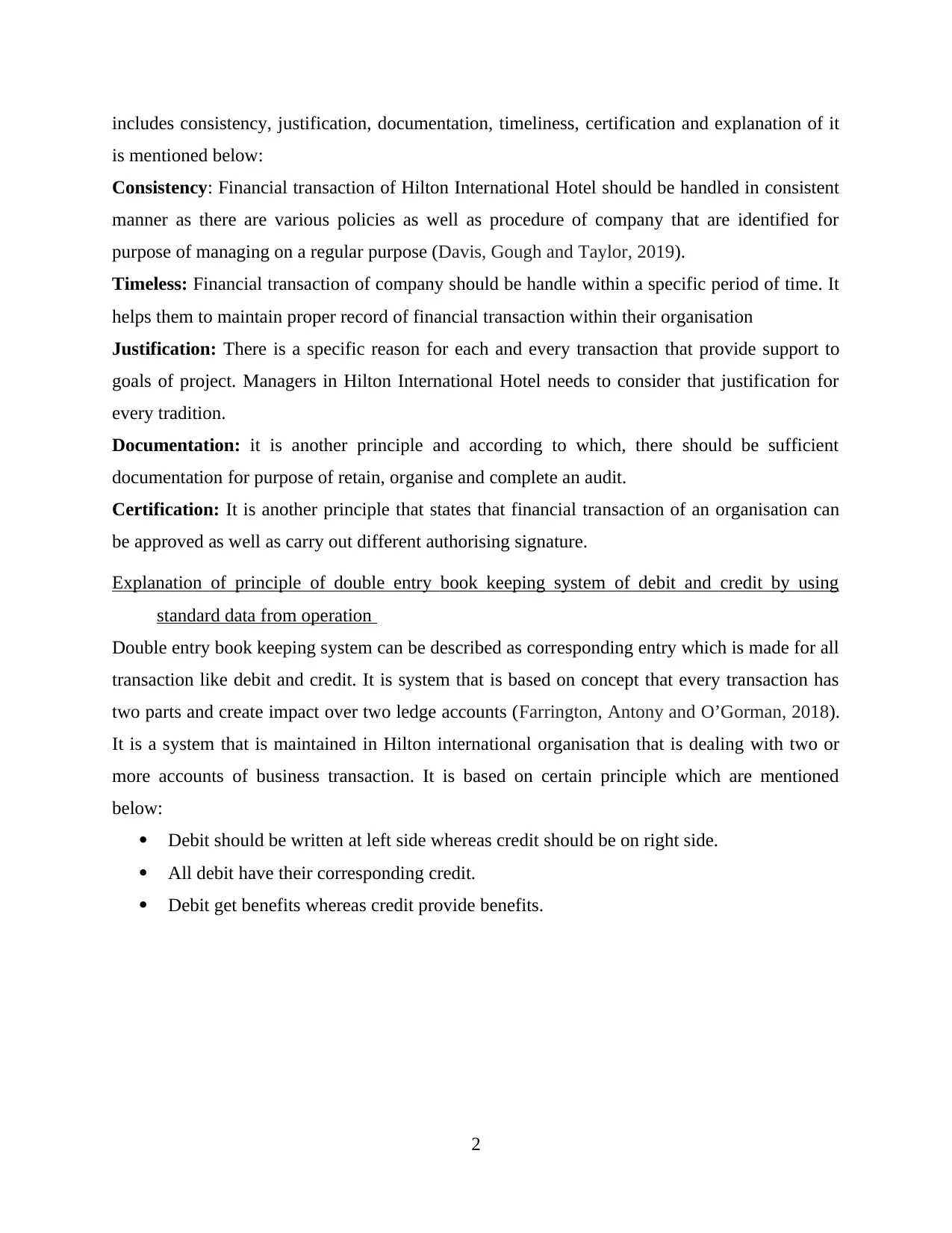
includes consistency, justification, documentation, timeliness, certification and explanation of it
is mentioned below:
Consistency: Financial transaction of Hilton International Hotel should be handled in consistent
manner as there are various policies as well as procedure of company that are identified for
purpose of managing on a regular purpose (Davis, Gough and Taylor, 2019).
Timeless: Financial transaction of company should be handle within a specific period of time. It
helps them to maintain proper record of financial transaction within their organisation
Justification: There is a specific reason for each and every transaction that provide support to
goals of project. Managers in Hilton International Hotel needs to consider that justification for
every tradition.
Documentation: it is another principle and according to which, there should be sufficient
documentation for purpose of retain, organise and complete an audit.
Certification: It is another principle that states that financial transaction of an organisation can
be approved as well as carry out different authorising signature.
Explanation of principle of double entry book keeping system of debit and credit by using
standard data from operation
Double entry book keeping system can be described as corresponding entry which is made for all
transaction like debit and credit. It is system that is based on concept that every transaction has
two parts and create impact over two ledge accounts (Farrington, Antony and O’Gorman, 2018).
It is a system that is maintained in Hilton international organisation that is dealing with two or
more accounts of business transaction. It is based on certain principle which are mentioned
below:
Debit should be written at left side whereas credit should be on right side.
All debit have their corresponding credit.
Debit get benefits whereas credit provide benefits.
2
is mentioned below:
Consistency: Financial transaction of Hilton International Hotel should be handled in consistent
manner as there are various policies as well as procedure of company that are identified for
purpose of managing on a regular purpose (Davis, Gough and Taylor, 2019).
Timeless: Financial transaction of company should be handle within a specific period of time. It
helps them to maintain proper record of financial transaction within their organisation
Justification: There is a specific reason for each and every transaction that provide support to
goals of project. Managers in Hilton International Hotel needs to consider that justification for
every tradition.
Documentation: it is another principle and according to which, there should be sufficient
documentation for purpose of retain, organise and complete an audit.
Certification: It is another principle that states that financial transaction of an organisation can
be approved as well as carry out different authorising signature.
Explanation of principle of double entry book keeping system of debit and credit by using
standard data from operation
Double entry book keeping system can be described as corresponding entry which is made for all
transaction like debit and credit. It is system that is based on concept that every transaction has
two parts and create impact over two ledge accounts (Farrington, Antony and O’Gorman, 2018).
It is a system that is maintained in Hilton international organisation that is dealing with two or
more accounts of business transaction. It is based on certain principle which are mentioned
below:
Debit should be written at left side whereas credit should be on right side.
All debit have their corresponding credit.
Debit get benefits whereas credit provide benefits.
2
⊘ This is a preview!⊘
Do you want full access?
Subscribe today to unlock all pages.

Trusted by 1+ million students worldwide
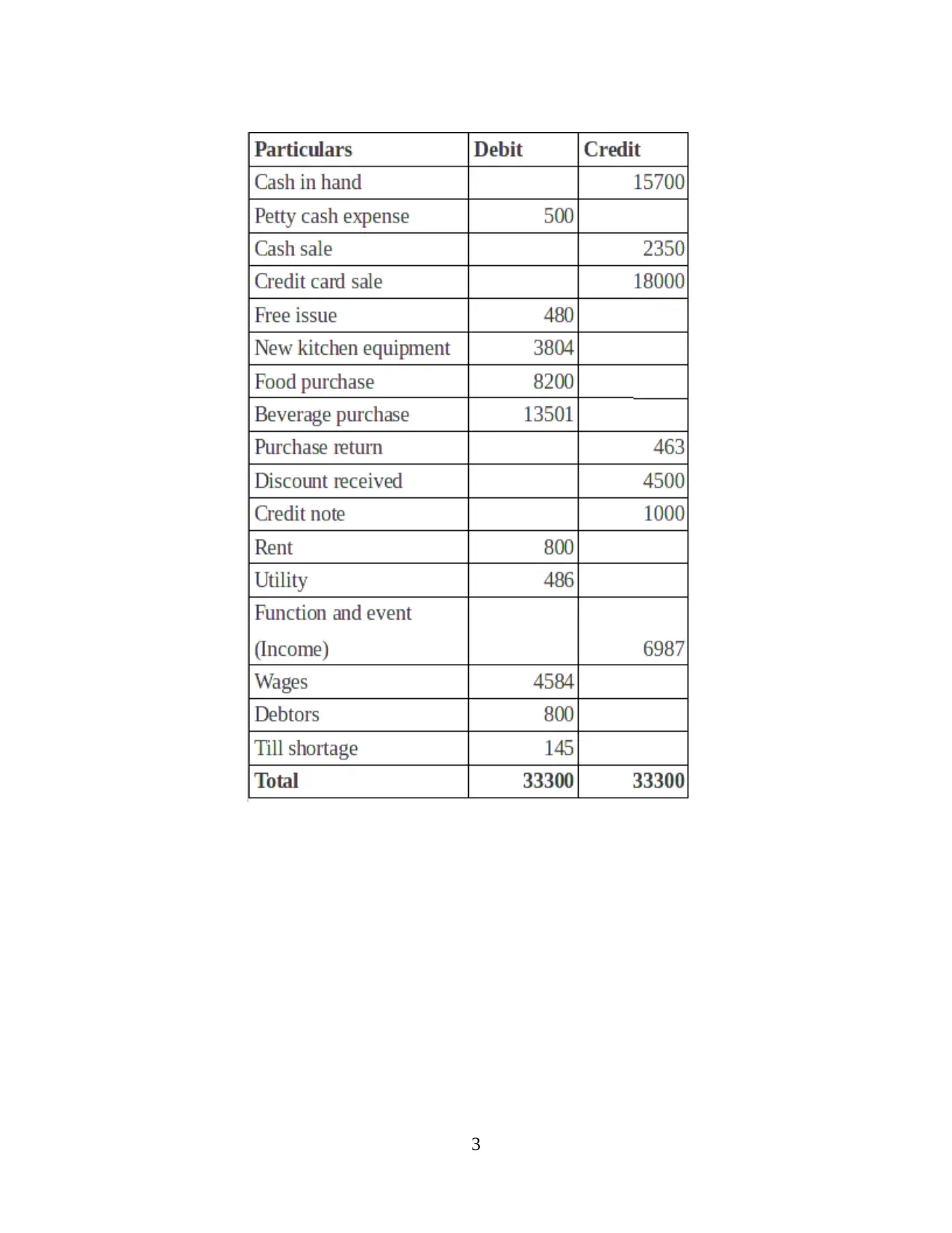
3
Paraphrase This Document
Need a fresh take? Get an instant paraphrase of this document with our AI Paraphraser
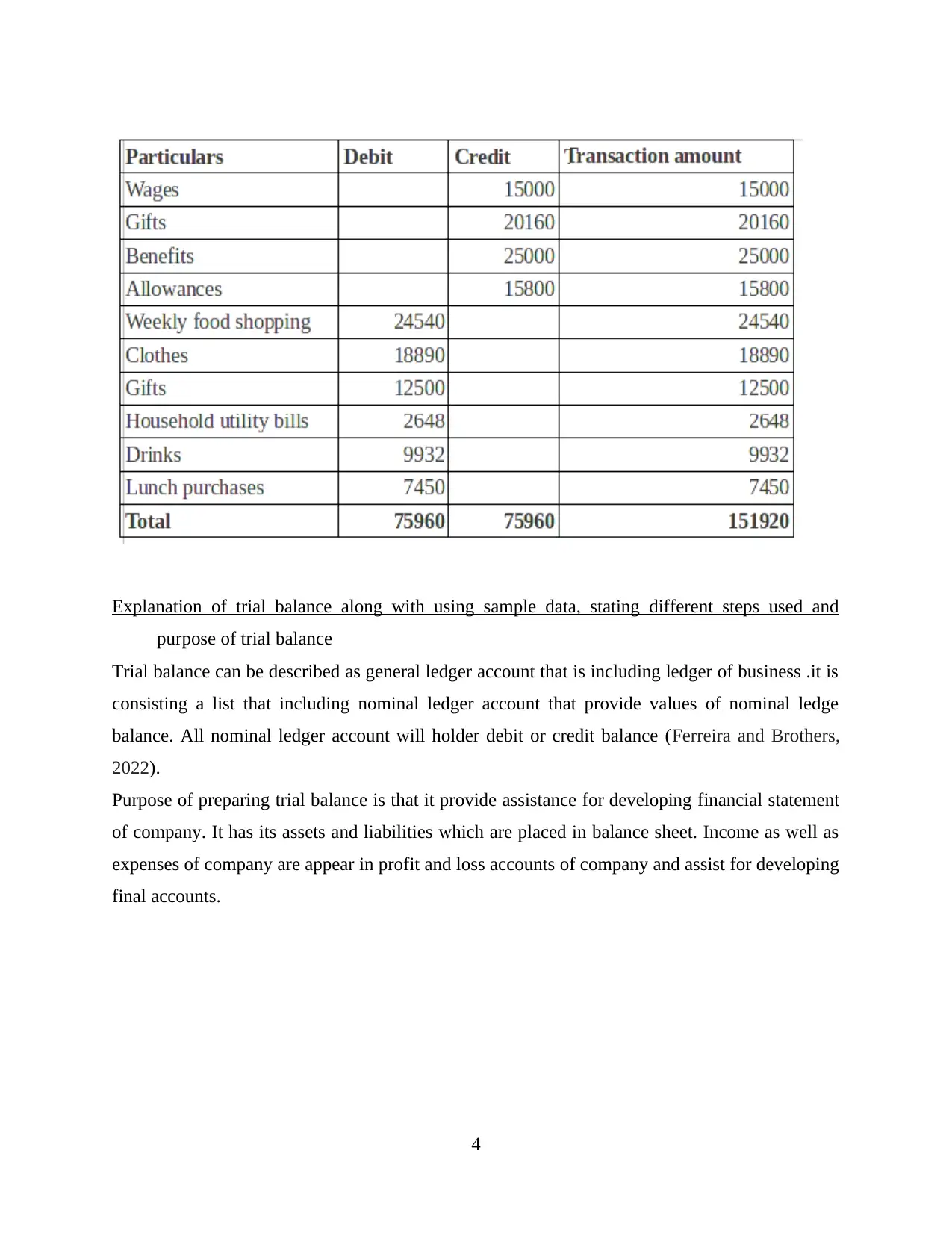
Explanation of trial balance along with using sample data, stating different steps used and
purpose of trial balance
Trial balance can be described as general ledger account that is including ledger of business .it is
consisting a list that including nominal ledger account that provide values of nominal ledge
balance. All nominal ledger account will holder debit or credit balance (Ferreira and Brothers,
2022).
Purpose of preparing trial balance is that it provide assistance for developing financial statement
of company. It has its assets and liabilities which are placed in balance sheet. Income as well as
expenses of company are appear in profit and loss accounts of company and assist for developing
final accounts.
4
purpose of trial balance
Trial balance can be described as general ledger account that is including ledger of business .it is
consisting a list that including nominal ledger account that provide values of nominal ledge
balance. All nominal ledger account will holder debit or credit balance (Ferreira and Brothers,
2022).
Purpose of preparing trial balance is that it provide assistance for developing financial statement
of company. It has its assets and liabilities which are placed in balance sheet. Income as well as
expenses of company are appear in profit and loss accounts of company and assist for developing
final accounts.
4
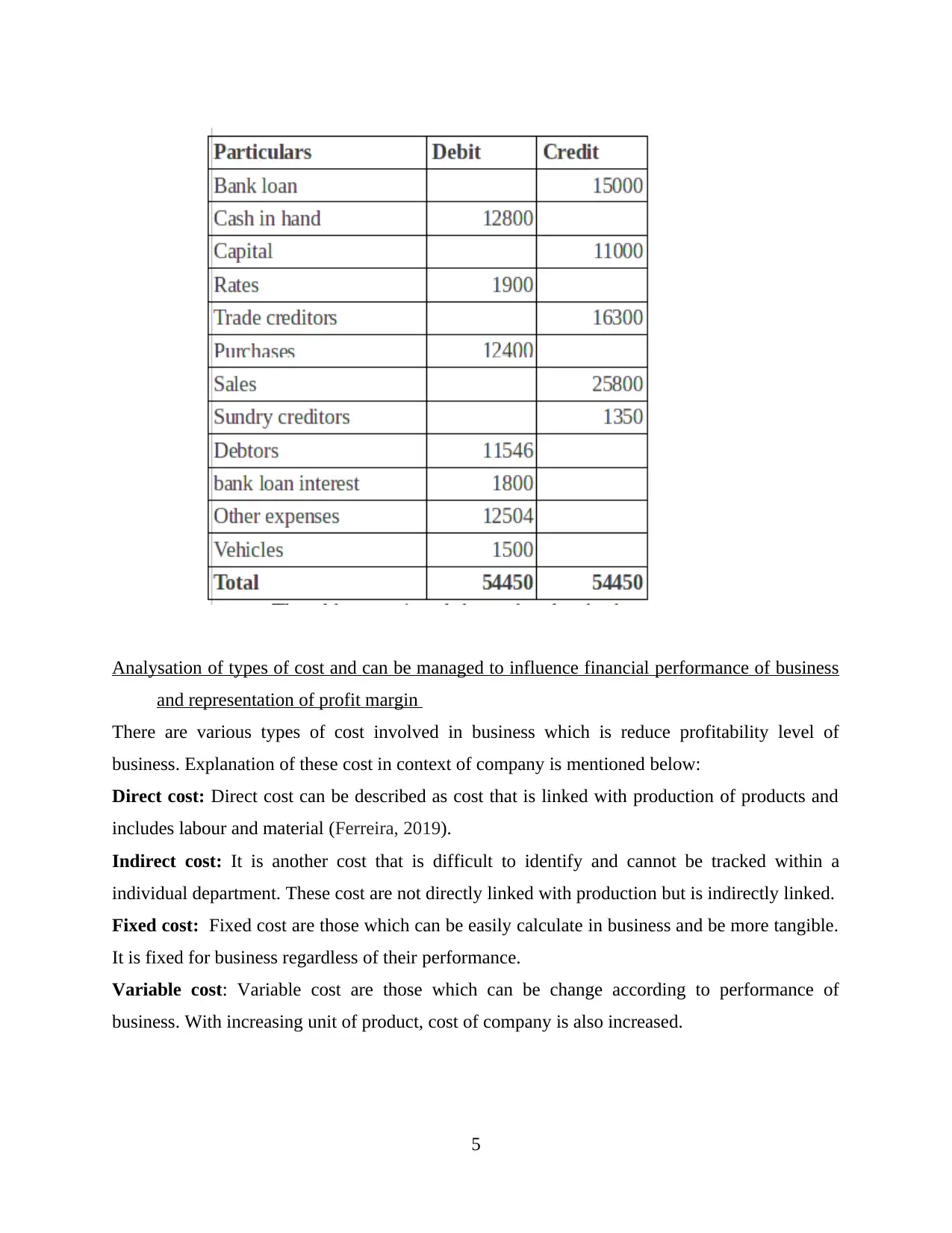
Analysation of types of cost and can be managed to influence financial performance of business
and representation of profit margin
There are various types of cost involved in business which is reduce profitability level of
business. Explanation of these cost in context of company is mentioned below:
Direct cost: Direct cost can be described as cost that is linked with production of products and
includes labour and material (Ferreira, 2019).
Indirect cost: It is another cost that is difficult to identify and cannot be tracked within a
individual department. These cost are not directly linked with production but is indirectly linked.
Fixed cost: Fixed cost are those which can be easily calculate in business and be more tangible.
It is fixed for business regardless of their performance.
Variable cost: Variable cost are those which can be change according to performance of
business. With increasing unit of product, cost of company is also increased.
5
and representation of profit margin
There are various types of cost involved in business which is reduce profitability level of
business. Explanation of these cost in context of company is mentioned below:
Direct cost: Direct cost can be described as cost that is linked with production of products and
includes labour and material (Ferreira, 2019).
Indirect cost: It is another cost that is difficult to identify and cannot be tracked within a
individual department. These cost are not directly linked with production but is indirectly linked.
Fixed cost: Fixed cost are those which can be easily calculate in business and be more tangible.
It is fixed for business regardless of their performance.
Variable cost: Variable cost are those which can be change according to performance of
business. With increasing unit of product, cost of company is also increased.
5
⊘ This is a preview!⊘
Do you want full access?
Subscribe today to unlock all pages.

Trusted by 1+ million students worldwide
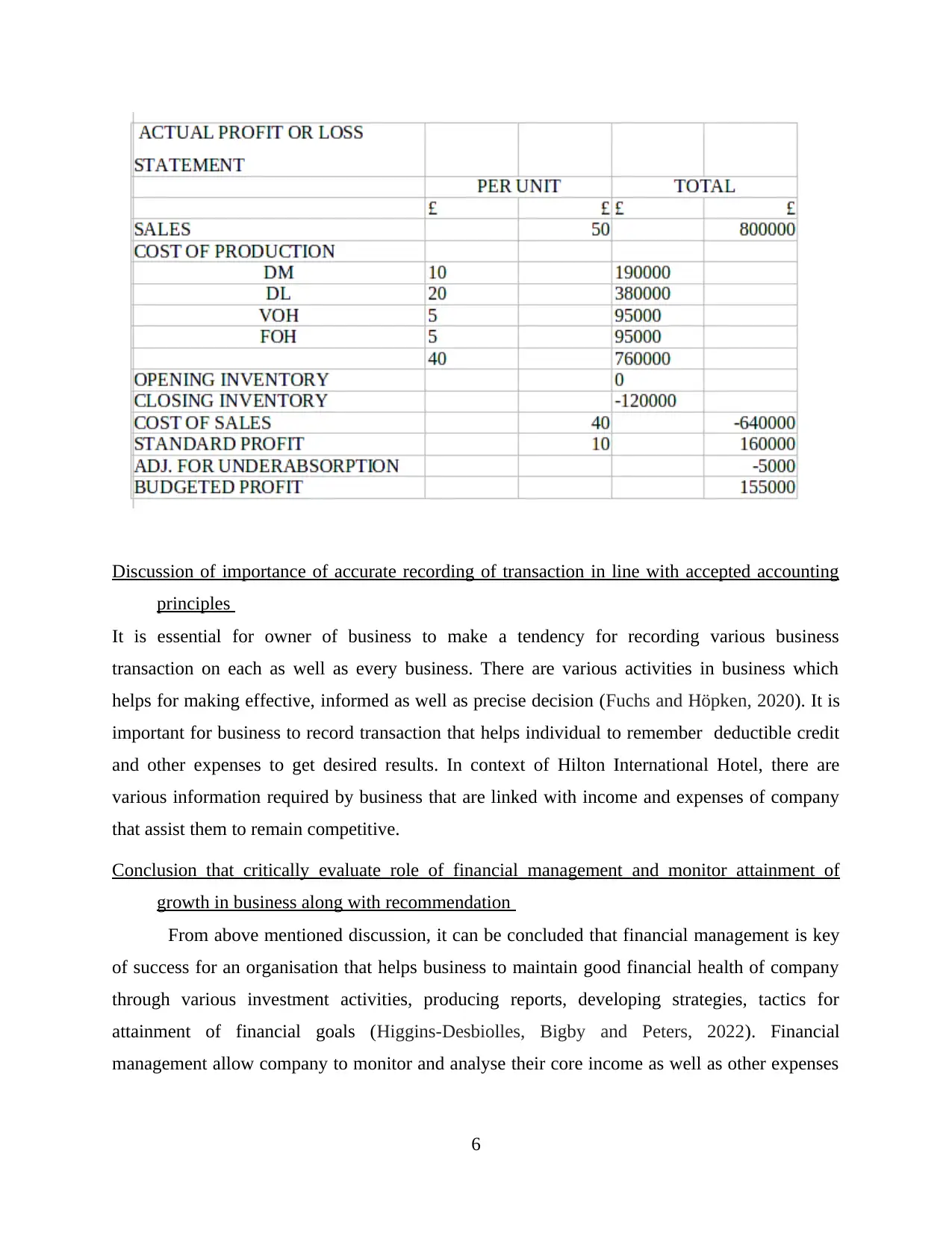
Discussion of importance of accurate recording of transaction in line with accepted accounting
principles
It is essential for owner of business to make a tendency for recording various business
transaction on each as well as every business. There are various activities in business which
helps for making effective, informed as well as precise decision (Fuchs and Höpken, 2020). It is
important for business to record transaction that helps individual to remember deductible credit
and other expenses to get desired results. In context of Hilton International Hotel, there are
various information required by business that are linked with income and expenses of company
that assist them to remain competitive.
Conclusion that critically evaluate role of financial management and monitor attainment of
growth in business along with recommendation
From above mentioned discussion, it can be concluded that financial management is key
of success for an organisation that helps business to maintain good financial health of company
through various investment activities, producing reports, developing strategies, tactics for
attainment of financial goals (Higgins-Desbiolles, Bigby and Peters, 2022). Financial
management allow company to monitor and analyse their core income as well as other expenses
6
principles
It is essential for owner of business to make a tendency for recording various business
transaction on each as well as every business. There are various activities in business which
helps for making effective, informed as well as precise decision (Fuchs and Höpken, 2020). It is
important for business to record transaction that helps individual to remember deductible credit
and other expenses to get desired results. In context of Hilton International Hotel, there are
various information required by business that are linked with income and expenses of company
that assist them to remain competitive.
Conclusion that critically evaluate role of financial management and monitor attainment of
growth in business along with recommendation
From above mentioned discussion, it can be concluded that financial management is key
of success for an organisation that helps business to maintain good financial health of company
through various investment activities, producing reports, developing strategies, tactics for
attainment of financial goals (Higgins-Desbiolles, Bigby and Peters, 2022). Financial
management allow company to monitor and analyse their core income as well as other expenses
6
Paraphrase This Document
Need a fresh take? Get an instant paraphrase of this document with our AI Paraphraser
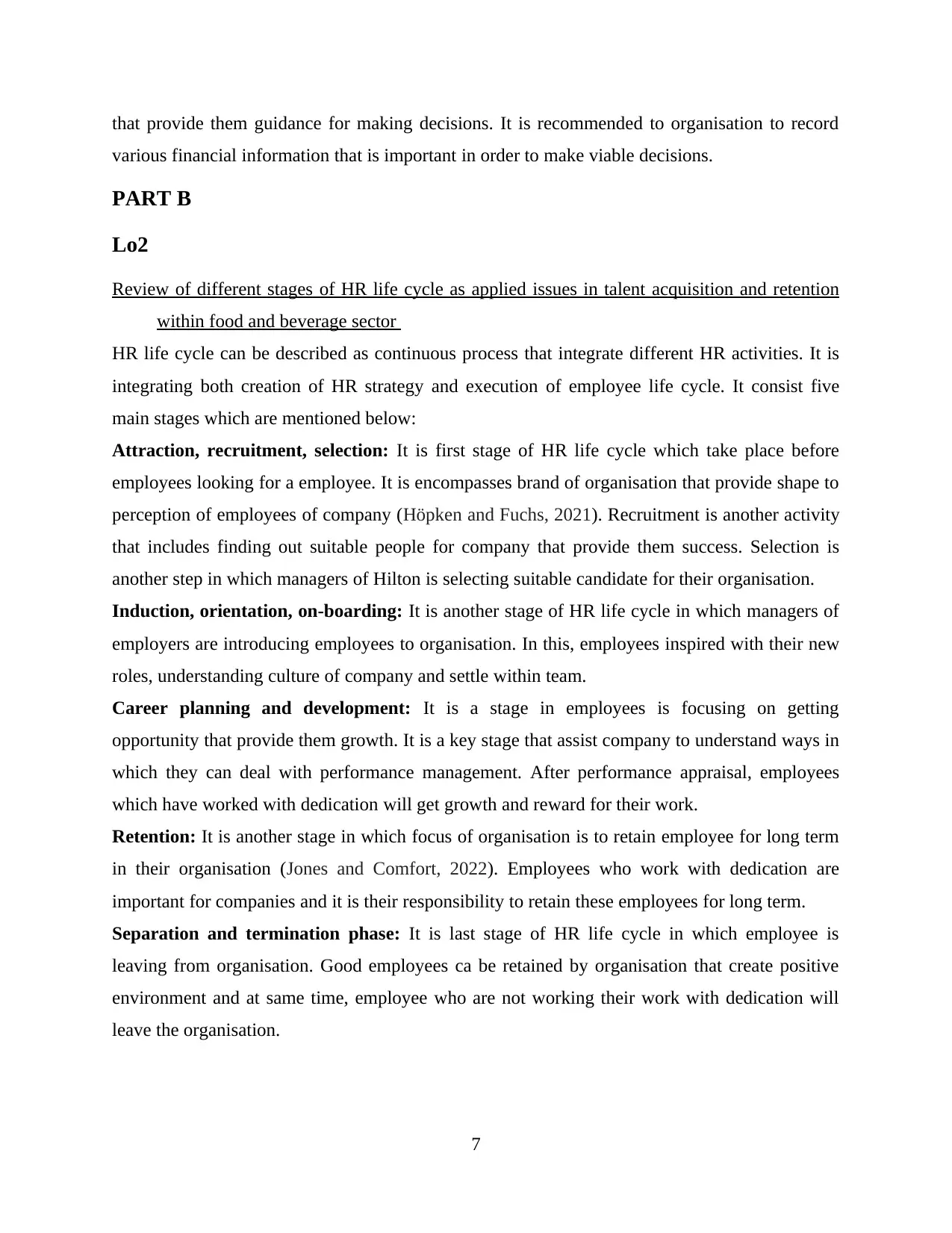
that provide them guidance for making decisions. It is recommended to organisation to record
various financial information that is important in order to make viable decisions.
PART B
Lo2
Review of different stages of HR life cycle as applied issues in talent acquisition and retention
within food and beverage sector
HR life cycle can be described as continuous process that integrate different HR activities. It is
integrating both creation of HR strategy and execution of employee life cycle. It consist five
main stages which are mentioned below:
Attraction, recruitment, selection: It is first stage of HR life cycle which take place before
employees looking for a employee. It is encompasses brand of organisation that provide shape to
perception of employees of company (Höpken and Fuchs, 2021). Recruitment is another activity
that includes finding out suitable people for company that provide them success. Selection is
another step in which managers of Hilton is selecting suitable candidate for their organisation.
Induction, orientation, on-boarding: It is another stage of HR life cycle in which managers of
employers are introducing employees to organisation. In this, employees inspired with their new
roles, understanding culture of company and settle within team.
Career planning and development: It is a stage in employees is focusing on getting
opportunity that provide them growth. It is a key stage that assist company to understand ways in
which they can deal with performance management. After performance appraisal, employees
which have worked with dedication will get growth and reward for their work.
Retention: It is another stage in which focus of organisation is to retain employee for long term
in their organisation (Jones and Comfort, 2022). Employees who work with dedication are
important for companies and it is their responsibility to retain these employees for long term.
Separation and termination phase: It is last stage of HR life cycle in which employee is
leaving from organisation. Good employees ca be retained by organisation that create positive
environment and at same time, employee who are not working their work with dedication will
leave the organisation.
7
various financial information that is important in order to make viable decisions.
PART B
Lo2
Review of different stages of HR life cycle as applied issues in talent acquisition and retention
within food and beverage sector
HR life cycle can be described as continuous process that integrate different HR activities. It is
integrating both creation of HR strategy and execution of employee life cycle. It consist five
main stages which are mentioned below:
Attraction, recruitment, selection: It is first stage of HR life cycle which take place before
employees looking for a employee. It is encompasses brand of organisation that provide shape to
perception of employees of company (Höpken and Fuchs, 2021). Recruitment is another activity
that includes finding out suitable people for company that provide them success. Selection is
another step in which managers of Hilton is selecting suitable candidate for their organisation.
Induction, orientation, on-boarding: It is another stage of HR life cycle in which managers of
employers are introducing employees to organisation. In this, employees inspired with their new
roles, understanding culture of company and settle within team.
Career planning and development: It is a stage in employees is focusing on getting
opportunity that provide them growth. It is a key stage that assist company to understand ways in
which they can deal with performance management. After performance appraisal, employees
which have worked with dedication will get growth and reward for their work.
Retention: It is another stage in which focus of organisation is to retain employee for long term
in their organisation (Jones and Comfort, 2022). Employees who work with dedication are
important for companies and it is their responsibility to retain these employees for long term.
Separation and termination phase: It is last stage of HR life cycle in which employee is
leaving from organisation. Good employees ca be retained by organisation that create positive
environment and at same time, employee who are not working their work with dedication will
leave the organisation.
7
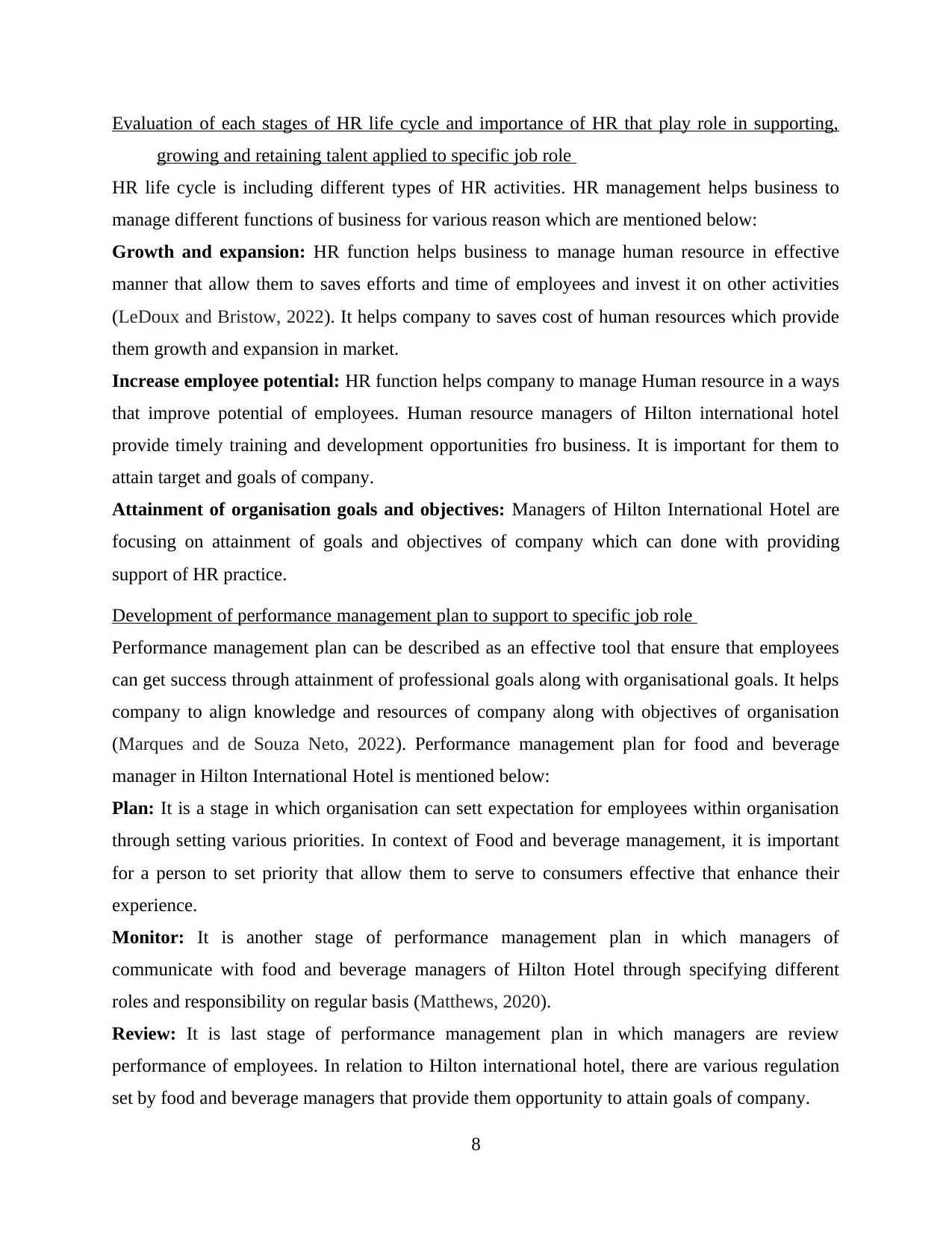
Evaluation of each stages of HR life cycle and importance of HR that play role in supporting,
growing and retaining talent applied to specific job role
HR life cycle is including different types of HR activities. HR management helps business to
manage different functions of business for various reason which are mentioned below:
Growth and expansion: HR function helps business to manage human resource in effective
manner that allow them to saves efforts and time of employees and invest it on other activities
(LeDoux and Bristow, 2022). It helps company to saves cost of human resources which provide
them growth and expansion in market.
Increase employee potential: HR function helps company to manage Human resource in a ways
that improve potential of employees. Human resource managers of Hilton international hotel
provide timely training and development opportunities fro business. It is important for them to
attain target and goals of company.
Attainment of organisation goals and objectives: Managers of Hilton International Hotel are
focusing on attainment of goals and objectives of company which can done with providing
support of HR practice.
Development of performance management plan to support to specific job role
Performance management plan can be described as an effective tool that ensure that employees
can get success through attainment of professional goals along with organisational goals. It helps
company to align knowledge and resources of company along with objectives of organisation
(Marques and de Souza Neto, 2022). Performance management plan for food and beverage
manager in Hilton International Hotel is mentioned below:
Plan: It is a stage in which organisation can sett expectation for employees within organisation
through setting various priorities. In context of Food and beverage management, it is important
for a person to set priority that allow them to serve to consumers effective that enhance their
experience.
Monitor: It is another stage of performance management plan in which managers of
communicate with food and beverage managers of Hilton Hotel through specifying different
roles and responsibility on regular basis (Matthews, 2020).
Review: It is last stage of performance management plan in which managers are review
performance of employees. In relation to Hilton international hotel, there are various regulation
set by food and beverage managers that provide them opportunity to attain goals of company.
8
growing and retaining talent applied to specific job role
HR life cycle is including different types of HR activities. HR management helps business to
manage different functions of business for various reason which are mentioned below:
Growth and expansion: HR function helps business to manage human resource in effective
manner that allow them to saves efforts and time of employees and invest it on other activities
(LeDoux and Bristow, 2022). It helps company to saves cost of human resources which provide
them growth and expansion in market.
Increase employee potential: HR function helps company to manage Human resource in a ways
that improve potential of employees. Human resource managers of Hilton international hotel
provide timely training and development opportunities fro business. It is important for them to
attain target and goals of company.
Attainment of organisation goals and objectives: Managers of Hilton International Hotel are
focusing on attainment of goals and objectives of company which can done with providing
support of HR practice.
Development of performance management plan to support to specific job role
Performance management plan can be described as an effective tool that ensure that employees
can get success through attainment of professional goals along with organisational goals. It helps
company to align knowledge and resources of company along with objectives of organisation
(Marques and de Souza Neto, 2022). Performance management plan for food and beverage
manager in Hilton International Hotel is mentioned below:
Plan: It is a stage in which organisation can sett expectation for employees within organisation
through setting various priorities. In context of Food and beverage management, it is important
for a person to set priority that allow them to serve to consumers effective that enhance their
experience.
Monitor: It is another stage of performance management plan in which managers of
communicate with food and beverage managers of Hilton Hotel through specifying different
roles and responsibility on regular basis (Matthews, 2020).
Review: It is last stage of performance management plan in which managers are review
performance of employees. In relation to Hilton international hotel, there are various regulation
set by food and beverage managers that provide them opportunity to attain goals of company.
8
⊘ This is a preview!⊘
Do you want full access?
Subscribe today to unlock all pages.

Trusted by 1+ million students worldwide
1 out of 18
Related Documents
Your All-in-One AI-Powered Toolkit for Academic Success.
+13062052269
info@desklib.com
Available 24*7 on WhatsApp / Email
![[object Object]](/_next/static/media/star-bottom.7253800d.svg)
Unlock your academic potential
Copyright © 2020–2026 A2Z Services. All Rights Reserved. Developed and managed by ZUCOL.



